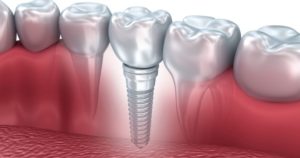How Long Do Dental Implants Last?

Dental implants are a popular solution for replacing missing teeth and restoring oral functionality. They offer a permanent solution that closely resembles the look and feel of natural teeth.
However, it’s natural to wonder how long dental implants last.
In this article, we will examine the lifespan of dental implants, factors that affect their longevity, and how to maintain them properly.
What are dental implants?
Definition and purpose
Dental implants are artificial tooth roots used to support dental restorations like crowns, bridges, or dentures. They are designed to mimic the structure and function of natural teeth, providing a long-term solution for individuals with missing teeth or severe dental issues.
Dental implants restore aesthetics and improve speech, chewing ability, and overall oral health.
Types of dental implants
The different types of dental implants are designed to address specific conditions and patient needs. Here are the different kinds:
- Endosteal implants are the most common type and involve placing the implant directly into the jawbone.
- Subperiosteal implants are placed on or above the jawbone but beneath the gum tissue.
- Zygomatic implants are used in cases with inadequate jawbone for traditional implants and are anchored in the cheekbone.
The lifespan of dental implants
The lifespan of dental implants can vary depending on several factors. While implants are designed to be long-lasting, proper care and maintenance are crucial for longevity.
Factors affecting longevity
Several factors can affect the lifespan of dental implants:
- Bone health and density: The quality and density of the jawbone play a vital role in the long-term success of dental implants. Sufficient bone support is necessary to ensure the stability and durability of the implant.
- Oral hygiene: Maintaining excellent oral hygiene is imperative for the long-term success of dental implants. Regular brushing, flossing, and antimicrobial mouth rinses help prevent infections and maintain healthy gum tissue.
Expected lifespan
On average, dental implants have a success rate of more than 95%.
With proper care, they can last for several decades or even a lifetime.
However, the patient’s oral health, lifestyle habits, and adherence to oral hygiene practices are determining factors.
Maintaining dental implants
To maximize the lifespan of dental implants, one must follow specific maintenance practices.
Oral hygiene practices
Maintain a thorough oral hygiene routine by brushing your teeth at least twice daily with a soft-bristled toothbrush and fluoride toothpaste.
Floss daily to remove plaque and debris from hard-to-reach areas around the implant.
Regular dental checkups
Schedule regular dental checkups and cleanings with your dentist.
These visits allow the dentist to monitor the condition of your dental implants, identify any potential issues early on, and provide necessary professional cleaning.
Lifestyle habits
Certain lifestyle habits can impact the longevity of dental implants.
Avoid smoking, as it can hinder healing and increase the risk of implant failure.
Limit your consumption of staining substances like coffee and red wine, as they can discolor dental restoration.
Signs of implant failure
While dental implants are generally reliable, there are instances where complications may occur.
Be aware of the signs of implant failure, which may include:
- Persistent pain
- Implant mobility
- Gum inflammation
- Visible changes in the implant area
If you experience any of these symptoms, contact your dentist immediately.
Increasing longevity of dental implants
To enhance the lifespan of dental implants, consider the following measures:
Proper oral care
Maintaining excellent oral hygiene practices, such as regular brushing, flossing, and antimicrobial mouth rinse, helps prevent plaque buildup and reduces the risk of implant-related complications.
Avoiding damaging habits
Avoid habits that can stress your dental implants, such as biting hard objects, using your teeth as tools, or grinding your teeth. These behaviors can damage the implant or the surrounding structures.
Regular dental visits
Stay consistent with your dental checkups to check that the implants are performing as intended. Your dentist will assess the condition of your implants, perform professional cleanings, and promptly address any concerns or issues.
FAQs
How successful are dental implants?
Dental implants have a success rate of more than 95%, making them a highly reliable tooth replacement option.
Can dental implants be done in one day?
Occasionally, dental implants can be placed and restored in a single day using advanced techniques such as immediate load or same-day implants.
Are dental implants painful?
Local anesthesia ensures you do not feel pain during the implant placement procedure. Afterward, you may experience discomfort, but it can be managed with over-the-counter pain medications.
Can dental implants fail?
While dental implant failures are rare, they can occur from poor oral hygiene, smoking, certain medical conditions, or inadequate bone support.
Can dental implants be removed if needed?
Dental implants are designed to be a permanent solution; however, in some cases, they can be removed if necessary. Your dentist will assess the situation and determine the appropriate course of action.
Conclusion
Dental implants offer a long-term solution for replacing missing teeth and restoring oral function. With proper care and maintenance, they can last for many years or even a lifetime.
By practicing good oral hygiene, scheduling regular dental checkups, and adopting healthy lifestyle habits, you can maximize the lifespan of your dental implants and enjoy the benefits they provide.
Book a consultation with the dentist today to discuss dental implant opportunities.
Or:
- Call us at: (317) 575-1120
- Email us directly at: reception@keystonedentistry.com
Keystone Dentistry is located in Indianapolis, IN, and we happily welcome folks from neighboring areas.


